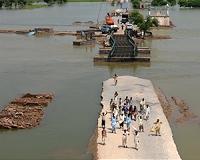 |
Geneva (AFP) Aug 20, 2010 The UN disaster prevention agency said Friday that communities should have been kept away from flood-exposed river banks in Pakistan, as it underlined the human hand in a string of catastrophes. "If people had not settled on the river banks, definitely the disaster would have been less, because that is the main cause of the disaster," said Salvano Briceno, director of the UN's International Strategy for Disaster Reduction. The ISDR also pointed to landslides in China, wildfires in Russia and drought in Niger this summer as examples of how communities and towns were increasingly placed or left in harm's way. "The vulnerability of human settlements is on the rise and is not yet being addressed by governments or communities," added Briceno. Briceno argued that while extreme weather or climate change and poverty added to the challenges, the biggest source of harm was people living in hazard-prone areas while too little was done to reduce the risks they face. "It is clearly human responsibility in the making of the disaster, disasters are not natural," he added, urging local authorities, donors and aid agencies to bolster long-term steps to cut those risks with the recovery. Briceno acknowledged that all four countries were doing something but the pace of change was too slow and scattered worldwide. It was also hampered by poverty, war and displacement, notably in Pakistan, and a focus on the response to disasters rather than preventing their impact. The UN official noted that the South Asian country confronted annual monsoons rains, faced added melting from Himalayan glaciers with global warming and disruptive shifts in weather patterns. "There are clearly, from nature's perspective, some aggravating factors. But the reality is that those river banks should never have been (open) for people to settle on," Briceno said, calling it a known risk. He nonetheless praised Pakistan's flood alert system and the response by the disaster management authority. "What is worrying is the long term effect, the displacement. By moving they might go to other risk areas," such as fragile slopes or quake zones, Briceno said. In Russia, Briceno blamed the lack of clearance of undergrowth in forests for amplifying wildfires that left up to 200,000 hectares (495,000 acres) of woodland and peat bog ablaze for more than a month, killing over 50 people and locking Moscow in a thick smog. More than 2,100 people were killed or missing and 12 million evacuated nationwide in China, following a spate of mudslides since July caused by torrential rains, inundating urban areas and burying parts of the northern city of Ankang. Briceno said "the magnitude of the challenge is huge," in China, even though local authorities were taking more steps than most countries to keep populations away from harm. Meanwhile, in impoverished Niger, where more than half the population faces famine, the impact of a drought that wiped out local harvests could have been tempered with a switch to less water hungry crops than traditional subsistence ones, the UN official claimed.
Share This Article With Planet Earth
Related Links Bringing Order To A World Of Disasters When the Earth Quakes A world of storm and tempest
 Commentary: Biblical catastrophe
Commentary: Biblical catastropheWashington (UPI) Aug 20, 2010 A failed nuclear weapons state of 180 million people, flooded from north to south over 600 miles in an area the size of Florida and an ongoing monsoon deluge that submerged thousands of villages, stranded 20 million and left 4.5 million unable to feed themselves, faced with a cholera epidemic, riots and extremist religious groups outperforming an inept civilian government in emergency relief, ... read more |
|
| The content herein, unless otherwise known to be public domain, are Copyright 1995-2010 - SpaceDaily. AFP and UPI Wire Stories are copyright Agence France-Presse and United Press International. ESA Portal Reports are copyright European Space Agency. All NASA sourced material is public domain. Additional copyrights may apply in whole or part to other bona fide parties. Advertising does not imply endorsement,agreement or approval of any opinions, statements or information provided by SpaceDaily on any Web page published or hosted by SpaceDaily. Privacy Statement |